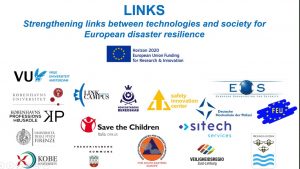“LINKS – Strengthening links between technologies and society for European disaster resilience” is a project awarded in the Secure Societies programme (SU-SEC) of the EU Horizon 2020 programme. The H2020 programme deals with R&D and innovation towards establishing disaster-resilient societies. Prof.dr.ir. Kees Boersma is the project’s PI. Team members at the VU: dr. Nathan Clark (scientific coordinator), dr. Romy van der Lee, dr. Chiara Fonio, dr. Robert Larruina, dr. Katherina Tzavella, junior researchers: Emmeline Roelofs, MSc, Like Rijkx, MSc., project management Risha Jagarnathsingh. The consortium consisting of 16 public and private partners from 8 European countries and 1 partner from Japan. The project’s budget is 5,2 M euro.

LINKS sets out to understand and assess the effects of social media and crowd-sourcing (SMCS) on European disaster resilience. The project develops a framework which can be used to understand, measure and govern SMCS for disasters, taking into account the diversity among disaster risk perception and vulnerability (DRPV), disaster management processes (DMP) and applied disaster community technologies (DCT) across European communities. The LINKS Framework consists of scientific methods, practical tools, and guidelines addressing researchers, practitioners and policy makers. It is developed and evaluated through five practitioner-driven European cases, representing different disaster scenarios (earthquake, flood, industrial, terror, drought), cutting across disaster management phases and diverse socioeconomic and cultural settings in four countries (Italy, Germany, Denmark, Netherlands). Furthermore, LINKS sets out to create a community of stakeholders, the LINKS Community, which brings together first-responders, public authorities, civil society organizations, business communities, citizens and researchers across Europe dedicated to improving European disaster resilience through the use of SMCS.
Partners
Vrije Universiteit Amsterdam – the Netherlands; Københavns Universitet – Denmark; Københavns Professionshøjskole – Denmark; Frederiksberg Kommune – Denmark; Hovedstadens Beredskab – Denmark; Università degli Studi di Firenze – Italy; Save the Children Italia – Italy; Link Campus University – Italy; Provincia di Terni – Servizio Protezione Civile – Italy; Safety Innovation Center e.V. – Germany; Deutsche Hochschule Der Polizei – Germany; Sitech Services of Chemelot – Netherlands; Veiligheidsregio Zuid-Limburg – The Netherlands; Federation of the European Union Fire Officer Associations – Luxembourg; Disaster Preparedness and Prevention Initiative for South Eastern Europe – Bosnia and Herzegovina; European Organisation for Security – Belgium; Center for Resilient Design, Kobe University – Japan.
